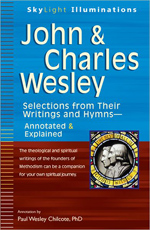"Love divine, all loves excelling,
Joy of heaven, to earth come down;
Fix in us thy humble dwelling;
All thy faithful mercies crown!
Jesus, thou art all compassion,
Pure, unbounded love thou art;
Visit us with thy salvation;
Enter every trembling heart. [1]
"Come, Almighty to deliver,
Let us all thy life receive; [2]
Suddenly return and never,
Nevermore thy temples leave.
Thee we would be always blessing,
Serve thee as thy hosts above,
Pray and praise thee without ceasing,
Glory in thy perfect love.
"Finish, then, thy new creation; [3]
Pure and sinless let us be.
Let us see thy great salvation
Perfectly restored in thee;
Changed from glory into glory,
Till in heaven we take our place,
Till we cast our crowns before thee,
Lost in wonder, love, and praise!"
"The most famous of Charles Wesley's Redemption Hymns, 'Love divine, all loves excelling,' enunciates the central themes of his and his brother's life and ministry. In Jesus he encountered the pure, unbounded love of God, a love that transcends all others and defines our lives as the children of God. The heart dominates his vision of Christianity because faith consists in relationships of love. God visits us in Jesus and offers us life abundant through the power of the Holy Spirit. The dominant theme of the Christian life is the desire never to be separated from the unconditional love we have come to know in Jesus, to serve, praise, and glory in this perfect Jove throughout eternity. The driving impulse of Wesley's vision of the Christian life is the fullest possible restoration of God's image in the life of every believer. The singer prays in imperative mode — visit us, reside in us, penetrate to the center of our hearts, and dwell with us forever!
"[1] Wesley acknowledges God as the source of pure, unbounded, extravagant love. In Jesus we see what genuine love looks like and how it behaves. Compassion defines God's life in the flesh.
"[2] This second line of the stanza can be read in two different ways, perhaps an intended double entendre. 'Let us all' expresses the possibility of universal redemption, while 'all thy life' implies God's desire to make us totally like Jesus. Those conformed to the image of Jesus in this life, claims Wesley, can be identified by their service, prayer, and praise.
"[3] Wesley prays for God to continue this process of restoration, moving us closer and closer to maturity in Jesus. Wesley defines this metamorphosis by the little word 'till.' We live in that time between what has been (what is no longer) and what will be (but is not yet). In this meantime, God continues to change us from one degree of glory to another, conforming us to the image of the risen Jesus, and sinking us deeper and deeper into love. Changed from glory into glory, the child of God falls prostrate before the Lord of all creation, 'lost in wonder, love, and praise.' "
